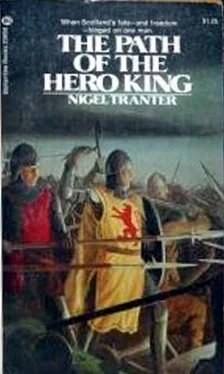I have not seen you since Methven fight, nephew, the King said, controlling his voice.
Though I have heard of your doings. I believe you were at Loudoun Hill. At Pembrokes side!
I was, the younger man agreed, as carefully.
To my sorrow.
Your sorrow? You regret it, then?
My sorrow is for this Scotland. And for you, my lord. That so sorry a travesty of battle should have been fought in the name of this realm. My regret for myself only that I had no opportunity to use my sword against your person.
The Bishop coughed, and seemed about to rebuke the young man, but Bruce held up his hand.
You would have fought me, slain me, then? At Loudoun Hill?
If you had been able?
I would have fought you there. Or other where In fair and knightly combat. To redeem, if I might, the honour of my mothers house!
Fair and knightly combat! Yet it was I who knighted you, man.
At Scone. Four years ago. Have you forgot?
I have not forgot-and judge it my greatest shame, my
Bruce drew a long breath.
You do not mince your words, nephew. It seems that you do not like me. Yet we used to be friends, as well as kinsmen.
I used to deem you honourable, sir.
Again Bruce restrained Balmyle.
I see that you name me sir, not Sire. Lord not Grace. Yet you helped make me King, at my coronation, Thomas.
You have besmirched that anointing and coronation. You have dragged the royal dignity in the mire of murder and brigandage.
You have tramped the code of chivalry underfoot. I no longer recognise you as my King. And would God I need not admit you as kin! The young mans pleasantly-modulated voice quivered a little, there.
As Bishop and friar stirred with disquiet, appalled indeed, Bruces patience was heavy, ironbound.
So you took Edward Longshanks for King? Edward who disembowelled knights. Who hanged three of your own uncles and your aunts husband. Who hung another aunt and your kinswoman Isobel of Buchan in cages on castle walls. You preferred his kingship to mine?
The old Kings misdeeds do not wash out yours, sir. And in the field he fought fairly, honestly, at least. The greatest warrior in Christendom. But you-you slay by night, like any thief. You ambush, you trick, you deceive. You have become no better than the man Wallace. You have not once battled in fair fight since your flight to Ireland.
Ireland …? What is this of Ireland?
After Methven, when I was captured, you fled your realm.
Leaving others to bear the English yoke. That is what I mean. And then returned with a horde of hired Irish cut-throats, foreign savages, to gain by terror and murder what you could not gain by honest means…
So that is what they told you! Bruce eyed the other with dawning comprehension.
You have been cozened, Thomas. Fed with lies and half-truths. Led by cleverer men than you are, so that you might be used as a stick for my back, a dagger under my armour. My own nephew! Do you not see it? I was never in Ireland.
I never left my own realm. I was in the Highlands and the Hebrides.
The men I landed with again at Turnberry, from Arran, and those my
brothers led into Galloway, were my own subjects. Islesmen -when none
in the Lowlands would rise for me! The other looked momentarily
nonplussed.
They said … they said…
Aye, they said! And you believed. Did James Douglas tell you no better?
Douglas! He is no better than yourself! Trained in your school.
His knightly vows forgotten. I would have no truck with him-though once I judged him honest.
The King sighed. He could have shaken this good-looking, headstrong son of his sister. Shaken him for the ignorant, self-righteous puppy he was. Yet, at the back of his mind, he knew a sort of relief, too. Relief that at least his blood, his mothers Celtic blood, had not after all apparently curdled to dastardly treachery as he had feared. Not in vile, craven self-seeking, at least. Whatever else he was, this young man before him was no craven. For if he believed that he, Bruce, was as he said, then his present defiant words and attitude could only lead to the rope or cold steel. It had been one of the hurts that nagged at him in many a sleepless night, that young Randolph should have changed sides, sold his King and his kinsman, in cowardice. Now he was at least beginning to understand.
After all, only a few years ago, even though it seemed in another life, when he was Randolphs age, he had thought much as this one did, filled with fine chivalric ideals, judging all by the knightly code, seeing war as only an extension of the tournament. Thus they had been brought up, to look on Edward Plantagenet, for instance, as the epitome of romance, Christendoms model, the crusading prince, the Norman-French influence allimportant- even though Randolph was in fact pure Celt. Even James Douglas had been of this mind-until rudely taught otherwise. This other still lacked the teaching, that was all.
Thomas, he said, with a major attempt at reasonableness, you berate me for not waging fair fight, as you name it. For ambushing and tricking my enemies. Winning my battles by my wits rather than the strength of my right arm. You conceive this not to be knightly, or the kingly way. I agree with you that it is not knightly.
But a king has more than chivalry to think on! But, at Methven -was that a knightly fray? When Pembroke, with whom you seem proud to fight, stole upon us by night, forced us to battle scarce awake. Did you conceive that knightly, that night?
When the other made no answer, the elder went on.
Pembroke so acted because this was war, not jousting. Not the lists and the tourney-ground. We are fighting now, not for honour, or glory; but for freedom, our very lives. And the continuing existence of Scotland. So I fight to win, lad, as best I may, using what weapons I have …
You fight for a throne! A kingdom, for yourself. And would lunge all that kingdom in blood to gain it! Is that freedom?
Would you have the English to rule Scotland?
Once you did not find that so ill! When Baliol would fill the throne, not Bruce. Is Plantagenet any worse a king for Scotland than Bruce? Or Baliol? Or Comyn? When Plantagenet would spare the land the everlasting bloodshed, the fire and famine and devastation?
They stared at each other for long moments, two strong men more like each other than they knew.
At length Bruce shrugged.
I have not time to deal with you now, he said.
You have drawn sword against your liege lord. You swore me fealty at my coronation. So you broke your oath and committed treason, both. For that, you know the penalty?
I do. I seek no mercy at your soiled hands, my lord.
Yet I would show mercy if I might. For you are of my own blood.
Nephew-let us start afresh. He extended a hand, open, palm upward.
We will talk of it more fully later. But meantime be reconciled. You have for a while forgotten your allegiance.
Now, let us be reconciled.
No, sir. I have been guilty of nothing to my shame. You arraign my conduct. It is yourself who ought to be arraigned. Since you have chosen to defy the King of England-to whom you more than once took oath of fealty-why do you not debate the matter like a true knight, in a pitched field? If you dare! Until you do that, I am no man of yours-whatever my blood.
That may come hereafter, nephew. Who knows how long hereafter? I shall choose that day, not the invaders. His voice changed and he made a gesture of finality.
Meantime, since you are so rude of speech, it would be fitting that your proud words should meet their due punishment. But… for the sake of my sisters memory, I shall hold my hand. You will be put close in ward until you know better my right and your duty. Master Bernardsummon the guard…
Читать дальше












